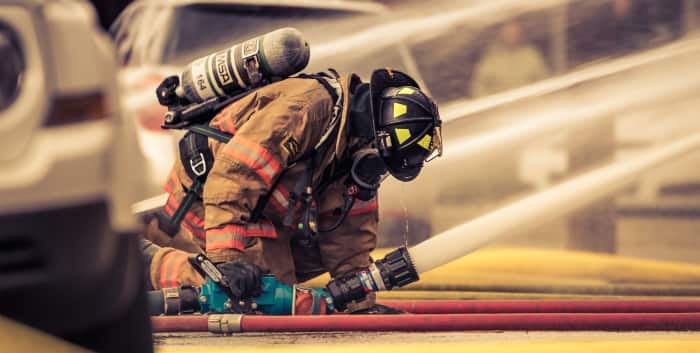First responders, such as EMTs, police officers, and firefighters, are highly susceptible to severe increases of stress and psychological disruption, or injury, based on their repeated exposures to traumatic events that they encounter every day on the job.
The men and women who go to work each day not knowing whether they will come home to their families are burdened with emotions that they may be unable and untrained to share. Trauma experienced on the job can cause tremendous problems that many of these heroes aren’t given the tools to deal with in a healthy way.
First Responder Related Trauma
Did you know that rates of depression, alcohol abuse, and binge drinking are much higher in firefighters and other first responders than in the civilian population?
Many first responders suffer from their repeated exposures to various traumas that cause conscious and subconscious stress, anxiety, and burnout. Add that to uneven cortisone levels and irregular adrenaline rushes, emergency response personnel become more and more susceptible to depression, anxiety, and other related mental illnesses that people tend to combat and self-medicate with drugs and alcohol.
These mental illnesses foster a fear of failure that can seem like a weakness to a hero that we like to believe is invincible. These individuals, our friends and family, feel a protective responsibility for their communities while nursing guilt over the sometimes extreme hours that take them away from their loved ones.
Many of our heroes aren’t able to process the pain that they, and their community experience. Traumatic pressure builds into their everyday lives in ways that can become difficult to hide, especially when drugs and alcohol are involved.
Examples of such traumatic pressure include:
- Intrusive thoughts, flashbacks
- Nightmares and anxiety-related behavior
- Constant worrying, agoraphobia that extends to loved ones
- insomnia, sleep deprivation
- Lack of interest in normal activities
They feel that they cannot talk to anybody about what they have seen and experiencedbecause no one would, or could, understand.
Many first responders may not be savvy in the laws of what they are legally allowed to say and what they are not to say to others outside their field with strict HIPAA constrictions. This internal struggle continues in gnawing silence and growing fear.
Symptoms Feeding Addiction
Many of our first responders suffer from several symptoms that extend from repeated trauma. These symptoms grow and feed off of each other, increasing in severity at a speed that is different for everyone. A person may begin to self-medicate slowly or quickly, depending on their nature, experiences, and prior tendency towards destructive behaviors.
Enabling becomes a huge problem when a family, who does not understand the job, just wants to help. Friends, who do understand the job, may share or encourage negative coping behaviors that they themselves have learned in an attempt to help someone get through the day.
Most firefighters reported that they believed that their binge-drinking amount was right on track with that of the civilian population. Roughly 85% of respondents reported binge drinking many times within the past month while only 62% of average males claimed the same. Drinking, especially, becomes more and more normal when everyone you know is doing it.
Unfortunately, the rate of abuse in male first responders as a whole was shown to be double the abuse rate of civilian males in 2014. But many first responders go through the rest of their lives without support until they are forced to. It seems to be more difficult for a member of a first responder unit to ask for help than it does for an ordinary citizen.
Addiction is a problem that can be addressed effectively if it wasn’t for the negative stigma that many people have toward mental illness and addiction in general.
The Key Is Reducing Stigma
The people who belong to dangerous or regimented career paths can be more susceptible to the negative stigma on mental health than in any other profession. These essential workers believe that mental health problems, along with any related addictions, may cause the public, and the leaders of their trade, to see their hurdle as a weakness. This can be frowned upon by superiors and their jobs can be affected.
We all know that saying about the weakest link in the chain, but what many people don’t know is that it takes strength, power, and confidence to ask for and search for help when help is needed. A healthy cop is a more effective protector. A more aware EMT is quicker on their feet and may save a life otherwise lost because of their crowded and affected thought process.
Mental health issues aren’t a sign of weakness, they are proof that the individual is not invincible, but human, as we all are. A targeted program that is created around an individual’s needs will only strengthen that metaphorical chain.
Treating Our First Responders With Care And Gratitude
Addiction stems directly from a disruption in mental health. When left unchecked, this can easily lead to accidental death and even suicide. Our first responders deserve the best care that we can give them and the gift of freedom and sobriety may be the ‘thank you’ that they have been waiting to hear.
The mental health of our first responders should be more of a priority and point of education than it already is. There is no shame, nor weakness, in seeking help and working towards a stronger and more stable emotional foundation. Recovery is always an available option and a reachable goal for our heroes.
First Steps Recovery in Fresno can help you build that strength and break down that stigma. Give us a call at 844-489-0836 to discuss your treatment options. Eliminate the stigma by speaking out to your friends and family. Be the one to say that your power lay in your ability to keep your mental health in check and others will follow.







